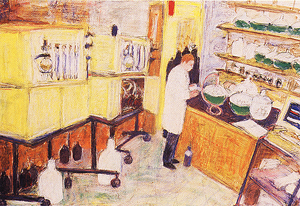'Peptide Synthesization'
(ink drawing with tempera, 29.5' x 40')
©May H. Lesser
In the university medical center, the chemist monitors the synthesization process in a peptide study. The chief of the laboratory praises the beauty of American academic research system, ‘We just don’t realize what we have got here, complete freedom to work on any project that we want to!’ He discussed his work today. It has been 10 years since I had drawn a technician in his laboratory. "Quantitative things are better. We know lots more today about what these things are doing when they bind to the cell in terms of triggering intracellular processes. We are beginning to be able to understand a lot about recessive molecules, characteristic structure, and function. So we have a lot more approaches to a particular problem. We know all this ties into molecular graphics. We can figure out three-dimensional structures of both the small and large molecules as a receptor from two different directions. We can create a drug."
"We are doing a fair amount of work in the cancer area and yes, in fact, we're doing something that could be classified in the metabolic area -- that is a growth hormone agent. It has an effect on metabolism; it is aimed ajavascript:iw_wizard_doFinish()t restoring growth hormone levels in elderly people. The older you get, the more you tend to have abnormal growth hormone levels. This translates into all kinds of physical problems potentially. If you can reconstitute growth hormone levels in a younger person, then some benefits might arise also for the elderly ... to maintain their muscle mass longer."
Last Reviewed: May 11, 2012



